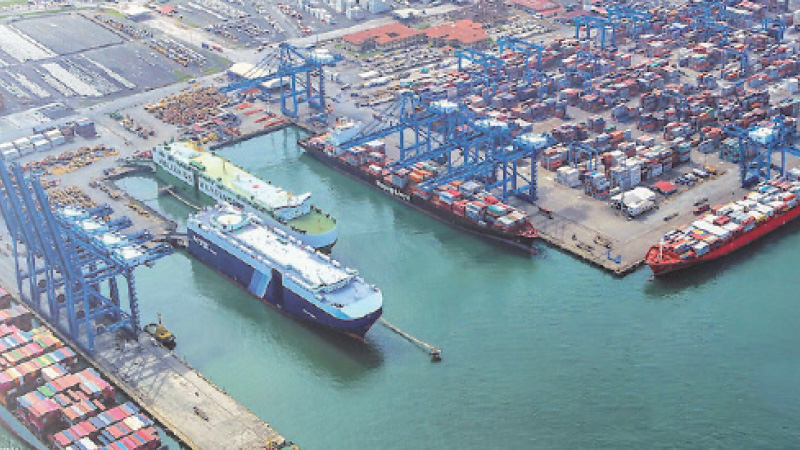MIT commits to growth and development of female staff
Of the 1,156 employees that make up Manzanillo International Terminal (MIT), one of the best facilities in its class worldwide, more than 208 are women functioning effectively, guiding and performing myriad tasks at all levels of the organisation.
In 2020, women represented 16% of the MIT workforce. This share has since increased to 18% (April 2024) giving real evidence of the company sustaining its stated commitments with respect to gender equity.
Terminal operations
According to data obtained from MIT, 68 women perform tasks and occupy positions directly related to terminal operation. Women gantry crane operators/mechanics, automatic stacking crane controllers, security and safety officers, maintenance technicians, line coordinators, vessel planners, yard control specialists are collectively a significant part of the MIT terminal operations team. In addition, women are also assigned administrative and management functions in all departments of the terminal.
“It’s about corporate governance. The company believes in gender equity and considers that, from a human rights management perspective, it is imperative to invest in women,” said Larissa Barrios, Business Development Manager at MIT. Responding to queries about performance results that can be directly attributed to women in the MIT workforce, Barrios spoke to decision-making and performance levels.
“Multiple studies have demonstrated the advantages of gender diversity in the workplace. Specifically for MIT, the presence of women in all the activities of the terminal improves decision-making, increases performance levels and compliance with legal and ethical standards.
“When multiple viewpoints are considered, the decision-making processes tend to be more thorough and comprehensive. Decision-making is critical in port operations, and decisions range from defining a million-dollar investment project to the daily planning of berth priorities. Gender diversity helps mitigate groupthink, while encouraging critical evaluation of options… resulting in better-informed decisions.
“Port operations need special attention to detail and a low rate of error to facilitate the flow of containers and cargo. Having women in the teams that plan and execute the operations is key for superior performance. In our experience at MIT, ladies are better at following instructions, performing operations in an orderly manner, and, communicating with stakeholders. In addition, women can manage the ambiguous situations that usually arise during cargo operations.
“In functions that require high legal and ethical standards, the presence of women has been instrumental. MIT faces continuous challenges to keep the security measures of the cargo handled at the port. But the high-value standards of women in positions such as protection officers, operations planning, and gate clerks support the company in achieving its objectives,” the MIT executive stated.
First female crane operator
In 2013, MIT gained attention for being the first to assign active duty to a woman Ship-to-Shore (STS) crane operator. The impeccable performance of this first STS crane operator, Liduvina Joseph, inspired other women to join the Crane department. And so, in 2015, a training programme was launched to include more women. Six women were selected to complete that programme.
MIT currently has seven female crane operators, all of whom have completed extensive and rigorous training. And, with more than 150 hours of crane practice, the women have proven fully capable of providing maintenance to the giant STS cranes.
“Women currently occupy several of the spots of the top 10 operators of the terminal, from a total of 90 crane operators,” Barrios stated.
In 2016, MIT’s track record of integration of female crane operators earned the terminal the Organization of American States (OAS) Inter-American Committee Maritime Award of the Americas in the Gender Equality Initiatives in the Ports category.
Leadership skills
Since 2022, MIT has been participating in a Female Leadership programme directed at Latin American women in middle and senior management positions in maritime-port industry companies and institutions. The goal of this programme, referred to as LIFE (Liderazgo Femenino), is to provide a space for learning and developing leadership skills, implementing negotiation tools, teamwork, conflict management, decision-making and self-confidence for effective presentations. As Barrios explained, besides being a space for personal development and reflection, LIFE aims to help attendees build a networking platform and business opportunities among executives from different countries, companies, and logistics institutions.
“Every year, the company organises a workshop to celebrate International Women’s Day. The 2024 workshop had a special focus on women working in the maritime, logistics and port industry. The event was attended by 60 female collaborators, highlighting MIT’s commitment to gender equality and women’s empowerment.”
Corporate commitment
It is a corporate commitment demonstrated not simply in words and phrases, but in action.
In its programme for providing facilities for sustaining women in the MIT workforce, in 2018, MIT established a lactation room for the convenience of mothers who are breastfeeding.
“This invaluable resource not only supports mothers in their breastfeeding journey, but also fosters a supportive and inclusive work environment. By facilitating continued breastfeeding through the provision of a comfortable and private space, employees can nurture their infants with the numerous health benefits that breast milk provides, including enhanced immune protection, optimal nutrition, and strengthened maternal-infant bonding. This initiative underscores the company’s commitment to promoting the holistic health and welfare of its employees and their families,” she explained.
MIT’s sustained programme of empowering, facilitating and respecting its female employees has gained the acknowledgement and admiration of staff.

